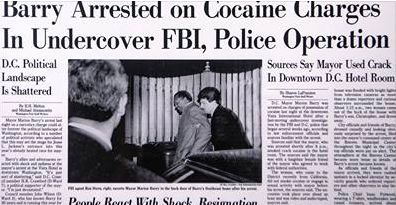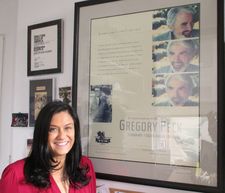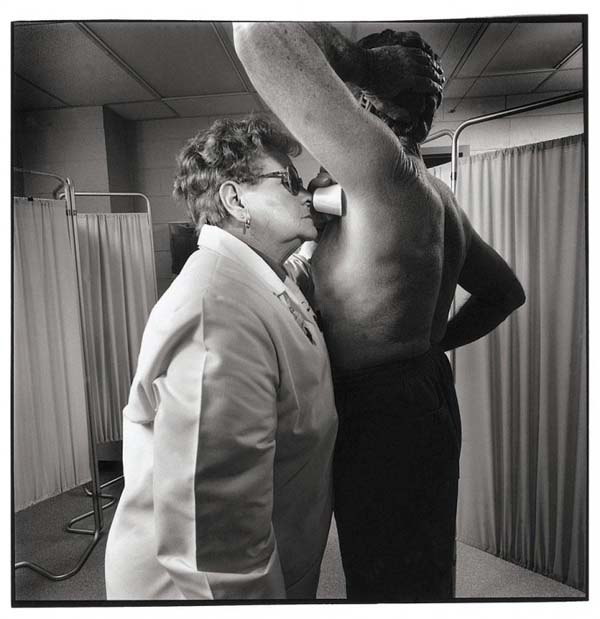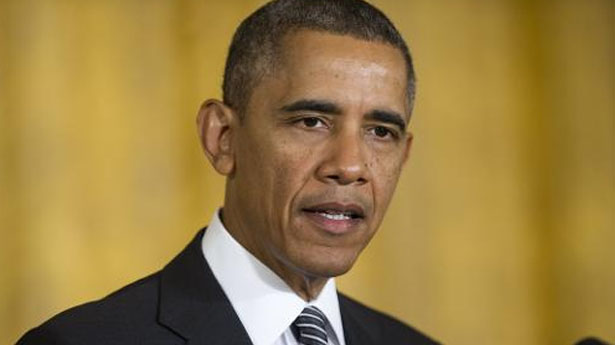
Here you go Fox And Friends. Your lead story for tomorrow. Run with it.

Here you go Fox And Friends. Your lead story for tomorrow. Run with it.

Michael Snyder, our resident film critic, stops by every once in a while to tell us what documentaries we should be catching. Today, he has two.
Listen to the original broadcast
David: Hello Mr. Snyder. First up, The Act of Killing.
Michael: Well, this is a fascinating, disturbing and wildly original documentary by a director named Joshua Oppenheimer, who decided to do something about the mass extermination of people in Indonesia in 1965 that was initiated by a military coup.
People in charge gathered together a bunch of gangsters and set them out to basically cleanse the country of what they said were Communists, and the Communists could be anything from farmers to poor people to genuine dissidents.
Michael: This film goes back to Indonesia and finds these now elderly killers and asks them to explain the how and the why of the murders that they committed and also to reenact them for the camera.
Michael: These guys, apparently, a number of them really love the American movies, and they’re given an opportunity to play act these incidents of killing and torture, and basically try to justify what they did when they did it and express very little remorse. Some of these guys killed hundreds of people, literally hundreds of people, each individually. One guy in particular, Anwar Congo, has bad dreams, and a lot of it must be guilt.
David: Does he know that he’s guilty?
Michael: Oh, absolutely. But it doesn’t change the fact that they did it and they tried to justify what they did. Even today, people are frightened of them as we see in the course of their filming and interacting with actual citizens of the northern Sumatra area.
It’s pretty astonishing stuff.
David: After Suharto fell in 1998 did Indonesia have any truth in reconciliation? Did any of these guys go to prison for these atrocities?
Michael: No. No, absolutely not. They walk the streets, they’re still feared and/or admired or cowed before. It’s a phenomenal film, and it’s surreal in places. There’s one particular kind of production number involving the music from the film Born Free with dancing girls and what looks like a gigantic fish. I can’t even – it is like nothing I’ve seen before. It’s disturbing, it’s phenomenal. It’s as if somehow, the Nazis were given a pass and were still around today and were kind of basically strutting down their street in their hometown and nobody gave a damn.
David: Maybe it’s time for another documentary where Henry Kissinger reenacts all the murders he’s committed in Indonesia’s East Timor and Cambodia.
Michael: There’s enough horror on the screen with these old Indonesian gangsters. You’ll be stunned, honestly.
David: And they’re proud of it?
Michael: Oh, yeah, absolutely. And one guy is just happy that he got away with it, another guy is somewhat tormented, some say you just can’t allow yourself to embrace any guilt in the issue. And there’s one guy, he was the stepson of a Communist whose stepfather just disappeared. They took him away. And what’s really remarkable about this is the palpable fear he still has in the presence of these old gangsters.
David: And ‘gangsters’ is the word for them?
Michael: Yeah. They actually wear it proudly.
David: And they live well, right?
Michael: I don’t know how standards of living are over there, but yes, fairly comfortably.
There’s also a very perverse moment when Anwar is with what appears to be grandchildren and he’s being gentle about a wounded duck, and meanwhile, completely callous about the people that he killed. One guy talks about walking through the city and encountering Chinese Communists, or people he perceived of as Chinese Communists, and just stabbing them one after another, just going on a tear.
David: President Obama lived in Indonesia for a while, didn’t he?
Michael: He may not have known these guys.
David: Maybe he’s responsible for this. OK, Running From Crazy.
Michael: Well, it’s basically a documentary about Mariel Hemingway and her fear of the emotional, psychological and genetic legacy that has led to at least two suicides in her family and a mentally disturbed elder sister. Mariel’s sister, Margaux, who was an actress and a model, took her own life and was a lovely, vibrant woman.
Mariel seems to have her head screwed on straight and she’s trying to keep her life together, and the camera follows her through her life and she talks about the past. There’s video footage shot by Margaux, and there’s a lot of discussion of the entire family, including Mariel and Margaux’s grandfather, the great author Ernest Hemingway, who had plenty of problems of his own.
Michael: The director is Barbara Kopple, who did Harlan County, USA, American Dream, and a lot of other pretty renowned, award-winning documentaries. It appears to have been partially financed I think by OWN, or has been shown on OWN, Oprah’s network. But it’s a beautiful depiction of someone basically plowing forward with her life, making sure she’s going to do the very best she can to keep it together. She’s wonderful in that.
David: And she’s turned to yoga and eating properly, and she has either a boyfriend or a husband?
Michael: She seems like a good person. She seems like someone who has her head screwed on. But it’s interesting to hear her reflect on her family and see the footage from the past, and realize that she’s grappled with tragedy and a fear of her own mind crumbling for much of her adult life. And it’s powerful in its own way. Reflecting on the past can actually prepare you for the future or completely turn your life around. This movie is about family bravery in the face of what could be destiny, genetic destiny, if you will.
David: Great. Michael Snyder, thank you for joining us.
Listen to the original broadcast
What do you think? Join the conversation below?

You watch football, we’ll watch everything else.

A nun has just given birth to a baby and says she’s named it after the new Pope. Hopefully the kid is called Francis and not Pope. The nun says she had no idea she was pregnant. With that kind of anatomical certitude sounds like she should be dispensing birth control advice to Republicans.
 ‘Nun gives birth in Italy, names baby Francis’ (via AFP)
‘Nun gives birth in Italy, names baby Francis’ (via AFP)
A Salvadorean nun who said she had no idea she was pregnant gave birth in Italy this week after she felt stomach cramps in her convent and was rushed to hospital, Italian media reported on Friday. The 31-year-old mother and her baby boy, who weighs…

In an interview with The New Yorker President Obama cheered on efforts in Washington and Colorado to legalize marijuana saying pot is no more lethal than alcohol. Wait, if pot is no more lethal than alcohol that means our criminal justice system is more lethal than pot. OK, Mr. President, now how about pardoning all those two million Americans behind bars for pot related offenses?
 Obama: Pot is ‘a bad habit’ that is no ‘more dangerous than alcohol’ (via Raw Story )
Obama: Pot is ‘a bad habit’ that is no ‘more dangerous than alcohol’ (via Raw Story )
In an interview with David Remnick published in The New Yorker on Sunday, President Obama equated smoking marijuana with “a bad habit and a vice, not very different from the cigarettes that I smoked as a young person up through a big chunk of my adult…

Katie Couric is under fire for an interview with two transgender women during which she focused, some say, far too much on whether or not the women had penises but not enough on what it means to be a transgender woman.
Listen to the original broadcast
David: For more on this, we are joined by Zack Ford, who covers LGBT issues for ThinkProgress.org. Sometimes curiosity can be detrimental to a transgender person, right?
Zack: Sure. This is a phenomenon that happens across all different kinds of groups where someone who’s a member of a group that’s often in the majority encounters someone who’s not part of that group, and tries to figure out what makes them different. So a white person asking a person of color if they can touch their hair, it minimizes that individual to the parts of their identity that set them apart and doesn’t embrace them as a full person.
So this is something that we saw in this Katie Couric interview where she’s focused so much on the process you go through, and for those women that were on the stage being interviewed by her, it reduces them to their bodies, and it’s very reductionist.

Critics say Katie Couric focused too much on the sizzle and too little on the plight of CeCe McDonald.
David: You write that a transgender person can’t discuss transgender issues in the media without first divulging the current status of their body.
Zack: They can say whatever they want to say. The problem is that those are the questions that they get asked. They have to defend and legitimize what it means to be transgender and what they’ve done to their bodies to realize their identities before they’re given the validity and respect that they deserve for just being people.
David: When we talk with a transgender person, it’s nobody’s business what the current state of their body is.
Zack: We lose the story of their community when we focus just on their bodies. They’re people just like the rest of us, and we need to focus on what will best support them and help them thrive and help them get out of poverty and help them get jobs and help them find places to live instead of just worrying about what body parts they have.
David: Exactly. How many transgender Americans are there?
Zack: That’s a complicated question to ask, just like it’s a complicated question to ask how many gay people are there. The best estimate that we have of people who openly identify as transgender is about 0.3% of adults in the population. So a little less than about a million people in the country.
But again, that’s people who openly identify as trans, people who might have gone through some sort of transition. It doesn’t really count for a lot of Americans who might have some variations in their gender identity but don’t “own” that as a trans identity. Or people who are still struggling to figure that out and have not come out and begun to transition.
So about 0.3% is the estimate that we have. It’s probably actually higher than a lot of people think it is, but it is a small population.
David: What do transgender Americans need to watch out for?
Zack: One big problem is not acknowledging your trans-identity can really have a lot of mental health consequences, and so we want trans people to feel safe to come out. What we have to do as a society is make sure that it’s safe for them to do that and to go through a process that allows them to find that unanimity within themselves.
David: Who is CeCe McDonald?
Zack: CeCe McDonald is a trans woman of color from Minnesota, and in June of 2011, she was out with some friends, and on the street they were assaulted by two white women and a man and a fight ensued. CeCe herself was punctured with a piece of glass in her cheek that also hurt her salivary gland. So she and her friends fought back, and in the end, the man who assaulted them was found dead. CeCe was arrested, was forced to plead guilty, and sentenced to 41 months in jail. This happened in 2011.
David: Any effort to get CeCe released?
Zach: Right now, Laverne Cox, the trans actress who stars on Orange Is the New Black, is producing a documentary called Free CeCe, which is about the way that CeCe, along with many trans women of color, are themselves the subject of persecution and often are not given justice through the justice system.
David: Is CeCe in a women’s prison or a men’s prison?
Zack: CeCe is in a men’s prison serving for second degree manslaughter.
David: Would Americans better serve the transgender community by getting past the physical and focusing solely on issues of identity?
Zack: I think I’d start by saying that I don’t think of trans people as struggling by nature. Being trans is not something that is a problem for them, but there are problems that society creates for them because of the fact that they’re trans.
Zack: So, yes, they go through their own journey that’s physical, and sometimes that can be a financial hardship for them if they can’t afford the surgery that will help them best realize their identities. But moreover, they are subject to rampant discrimination, not unlike CeCe has experienced both for being targeted with an act of violence and then not given justice in the end.
So it’s often a problem when we get so caught up in understanding what it means to be trans. It’s something so strange to us, we don’t understand what it must be like to not have a gender that corresponds with our body. We get caught up in their journeys physically with their bodies. But then we lose sight of the lived experience that they have and the way that they suffer discrimination both for being trans and just for being women sometimes, for trans women who are facing their own kind of discrimination.
So I think that we have so much to learn from the trans community because the kinds of identities that they find in themselves teach us a lot about ourselves and the boxes that we often put ourselves into. So I think it’s great to explore that diversity and celebrate all the different identities within that community.
Zack Ford covers LGBT issues for ThinkProgress.org.
Listen to the original broadcast
What do you think? Please join the conversation below.